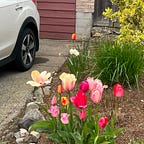Their usage reasoned with the chance I would need guidance in the night and utilized in both my mother and grandmother’s home the duration of my childhood, I have been bothered by the nightlights’ existence for some time now, as I continue to struggle in justifying a running yet unoccupied light.
I’d resentfully glare at their artificiality as I found them socketed, quickly concluding that the burned-in-my-mind, sopped-from-TV frames of melting ice glaciers and malnourished polar bears were fueled by such frivolous luxuries. As years passed and I found myself enrolling in my college’s sociology department, I was allotted time to reflect on the exampled beginnings of injustice acknowledgment, grasping that this difference in thought is perhaps the definite polarizer between older and newer generations: environmental views.
A 2019 study conducted by Yale’s Climate Change Communication Program states that while 73% of Millennials (born between 1981 and 1996) consider global warming as “personally important,” 63% of Baby Boomers (born between 1946 and 1964) and 58% of those belonging to the Silent Generation (born between 1928 and 1945) declared the same.
Interestingly enough, 2019 data from the Federation of American Scientists writes that at the start of the 116th Congress (which began January 3rd, 2019), the average age among members of Congress was 57.6 years old. The cohort expected to make federal laws for the largest carbon polluter in world history is mostly comprised of a generation that admittedly recognizes environmental issues as low importance.
We cannot expect these “representatives” to preserve our views, nor our planet.
Those born between 1997 and 2015, “Gen-Z’ers,” escaped the opulence of ignorance the generations before us breathed. As I, both a Seattleite and member of the Gen-Z generation, spend weeks living with the worst air quality in the world due to surrounding record-breaking wildfires and lose my twenties to a preventable pandemic — both byproducts of a late-capitalist world — I mourn the wasted finites spent on dated and trivial comforts such as the nightlight.
Our socialization was unfairly bombarded with this nouveau responsibility, as if *we* are the world’s saviors. Incorporated in public school’s curriculum, an inescapable political topic and more tangible than ever before, climate change’s true culprit is consistently and successfully deflected: capitalism. Easily bought and apathetic politicians are not initiating true evolve — as our vital natural resources burn and oceans fester with pollution.
This unfolding generational miscommunication is not only inequitable but creates a maddening double standard. As we are told it is up to *us* to “save the planet,” we are underrepresented within all government branches and are excluded from voting until the decrepit age of 18. This is how our “democracy” disenfranchises us while uplifting the few it was designed to.
*“Boomers” is used here as an umbrella term for the elderly, although I recognize it as wholly inaccurate.
